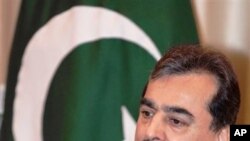Pakistan's ruling party is struggling to keep its grip on power a day after a key partner quit the governing coalition, denying it the majority in the national parliament. The prime minister is meeting with opposition politicians in a bid to head off a possible no-confidence vote.
Last month, a small party in the parliament, the Jamiat Ulema-e-Islam, announced it was switching to the opposition in parliament and demanded Prime Minister Yusuf Raza Gilani step down.
But the major political setback came Sunday when the second largest party in the ruling coalition, the Muttahida Quami Movement,announced it was also ending its partnership with the government. The move has turned Prime Minister Gilani's government into a minority coalition in parliament.
MQM senior leader Faisal Sabzwari explained the party's decision to switch to the opposition.
"We were not taken into confidence in many decisions whether they are economic or political or governmental decisions, and that is why we have pulled ourselves out from the federal cabinet. And now we have announced to sit in the opposition because of the recent price hike and petroleum hike," Sabzwari said.
Prime Minister Gilani has dismissed suggestions the latest political crisis will cause the collapse of his government. He met with leaders of two major opposition parties, including former Pakistani leader Nawaz Sharif's Pakistan Muslim League.
Speaking to reporters after the meetings, the prime minister said there is consensus among political parties that the current democratic system must stay on course.
Legal experts say there is little threat to Mr. Gilani's administration, despite its lost majority, unless opposition parties impose a no-confidence vote.
Former justice Tariq Chaudhry says deep divisions among the opposition parties are likely to discourage attempts to dislodge the prime minister.
"They have to suggest the name of the proposed prime minister, and I think and I believe that it would not be possible for them to bring a consensus prime minister because on that point there will be division among the parties," said Chaudhry.
The chief spokesman of former Prime Minister Nawa Sharif's opposition party, Ahsan Iqbal, acknowledges that with 92 members in the 342-seat legislative National Assembly, his party is not in a position to push for a no-confidence vote.
"If we file a no-confidence motion and tomorrow we see that one party has made a deal with the government, other party has made another deal with the government and then we are left in the middle that would be very damaging for our own politics," Iqbal said. "So therefore we have to watch the situation, and unless we have the confidence that a no-confidence motion will succeed and also result in a stable government we will be very reluctant to just jump on the bases of certain splashes created by certain political actors (reference to rival MQM)."
The political turmoil has hit Pakistan as it grapples with a fragile economy and security threats posed by al-Qaida-led militant groups.
The ruling coalition headed by the Pakistan Peoples Party has struggled in recent weeks to keep its allies together amid rising criticism the government has failed to improve economic conditions, check corruption and halt growing inflation.
Some critics say the defecting parties could be using the political crisis to win concessions from the government, but party representatives have dismissed these suggestions.
The next elections are due in 2013, but most political groups are not in favor of holding early polls amid rising militant attacks.
Some political and security analysts argue that no political party or a new coalition would like to replace the current Pakistani government because of the critical economic problems that have forced the country to rely on $11-billion loans from the International Monetary Funds.
The IMF wants Pakistan to significantly reform its economy in order to keep the loan program going.
There are also concerns the political crisis could distract Pakistan's anti-terrorism efforts, which the United States says are critical for the international military campaign against Taliban extremists in neighboring Afghanistan. But security experts in Pakistan say the war is being fought by the powerful military that has not been influenced by political developments in the country.




